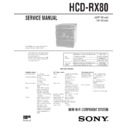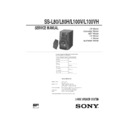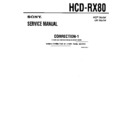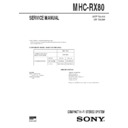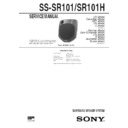Read Sony HCD-RX80 / MHC-RX80 Service Manual online
MICROFILM
MINI Hi-Fi COMPONENT SYSTEM
AEP Model
UK Model
SERVICE MANUAL
HCD-RX80
Model Name Using Similar Mechanism
HCD-RX70
CD Mechanism Type
CDM38L-5BD29AL
Base Unit Name
BU-5BD29AL
Optical Pick-up Name
KSS-213D/Q-NP
Model Name Using Similar Mechanism
HCD-H881
Tape Transport Mechanism Type
TCM-220WR2
CD
Section
Section
Tape deck
Section
Section
SPECIFICATIONS
*
Dolby noise reduction manufactured
under license from Dolby Laboratories
Licensing corporation.
"DOLBY" and the double-D symbol
under license from Dolby Laboratories
Licensing corporation.
"DOLBY" and the double-D symbol
a
are trademarks of Dolby Laboratories
Licensing Corporation.
Licensing Corporation.
HCD-RX80 is the tuner, deck, CD and
amplifier section in MHC-RX80.
amplifier section in MHC-RX80.
Amplifier section
DIN power output
40 + 40 watts
(6 ohms, at 1 kHz, DIN)
(6 ohms, at 1 kHz, DIN)
Continuous RMS power output
55 + 55 watts
(6 ohms at 1 kHz,
10 % THD)
(6 ohms at 1 kHz,
10 % THD)
Music power output 95 + 95 watts
(6 ohms at 1 kHz, 10%
THD)
THD)
Inputs
VIDEO/MD IN (phono
jacks): voltage 250 mV,
impedance 47 kilohms
MIX MIC (phone jack):
sensitivity 1 mV, impedance
10 kilohms
jacks): voltage 250 mV,
impedance 47 kilohms
MIX MIC (phone jack):
sensitivity 1 mV, impedance
10 kilohms
Outputs
VIDEO/MD OUT (phono
jacks): voltage 250 mV,
impedance 1 kilohms
PHONES (stereo phone
jack): accepts head phones
of 8 ohms or more.
SPEAKER: accepts
impedance of 8 to 16 ohms.
SURROUND SPEAKER
accepts impedance of 16
ohms.
jacks): voltage 250 mV,
impedance 1 kilohms
PHONES (stereo phone
jack): accepts head phones
of 8 ohms or more.
SPEAKER: accepts
impedance of 8 to 16 ohms.
SURROUND SPEAKER
accepts impedance of 16
ohms.
Tape player section
Recording system
4-track 2-channel stereo
Frequency response 60 – 13,000 Hz (± 3 dB),
(DOLBY NR OFF)
(DOLBY NR OFF)
using Sony TYPE I
cassette
60 – 14,000 Hz (± 3dB),
using Sony TYPE II
cassette
cassette
60 – 14,000 Hz (± 3dB),
using Sony TYPE II
cassette
Wow and flutter
± 0.15% W. Peak (IEC)
0.1% W. RMS (NAB)
± 0.2 % W. Peak (DIN)
0.1% W. RMS (NAB)
± 0.2 % W. Peak (DIN)
CD Player section
System
Compact disc and digital
audio system
audio system
Laser
Semiconductor laser
(
(
λ
=780 nm)
Emission duration:
continuous
continuous
Laser output
Max. 44.6 µW*
* This output is the value
measured at a distance of
200 mm from the objective
lens surface on the Optical
Pick-up Block with 7 mm
aperture.
* This output is the value
measured at a distance of
200 mm from the objective
lens surface on the Optical
Pick-up Block with 7 mm
aperture.
Frequency response 2 Hz – 20 kHz (± 0.5 dB)
Wavelength
Wavelength
780 – 790 nm
Signal-to-noise ratio More than 90 dB
Dynamic range
Dynamic range
More than 90 dB
CD OPTICAL DIGITAL OUT
(Square optical connector jack, rear panel)
Wavelength
(Square optical connector jack, rear panel)
Wavelength
600 nm
Output Level
– 18 dBm
– Continued on next page –
– 2 –
MODEL IDENTIFICATION
– BACK PANEL –
– BACK PANEL –
PARTS No.
Tuner section
FM stereo, FM/AM superheterodyne tuner
FM tuner section
Tuning range
AEP, UK, G, AED:
AEP, UK, G, AED:
87.5 – l08.0 MHz
(50 kHz step)
(50 kHz step)
EE, CIS:
65.0 – 74.0 MHz (10 kHz step)
87.5 – 108.0 MHz
(50 kHz step)
87.5 – 108.0 MHz
(50 kHz step)
Aerial
FM Lead aerial
Aerial terminals
75 ohms unbalanced
Intermediate frequency 10.7 MHz
UKV tuner section (EE, CIS)
Tuning range
65.0 – 74.0 MHz
(10 kHz step)
Polar Stereo
(10 kHz step)
Polar Stereo
AM tuner section
Tuning range
MW: 531 – 1,602 kHz
(with interval set at 9 kHz)
LW: 153 – 279 kHz
(with interval set at 3 kHz)
(with interval set at 9 kHz)
LW: 153 – 279 kHz
(with interval set at 3 kHz)
Aerial
AM loop aerial
External aerial terminal
External aerial terminal
Intermediate frequency 450 kHz
General
Power requirements
220 – 230 V AC, 50/60 Hz
Power consumption
130 watts
Dimension (w/h/d)
Approx. 280
×
330
×
366 mm
Mass
Approx. 8.1 kg
Supplied accessories:
AM loop aerial (1)
Remote RM-SD70 (1)
Sony SUM-3 (NS)
batteries (2)
FM lead aerial (1)
Speaker cords (4)
Remote RM-SD70 (1)
Sony SUM-3 (NS)
batteries (2)
FM lead aerial (1)
Speaker cords (4)
Design and specifications are subject to change without notice.
MODEL
PARTS NO.
AEP, UK, G, AED model
4-986-844-5
π
EE, CIS model
4-986-844-6
π
• Abbreviation
AED : Northern European model
G
G
: German model
EE
: East European model
– 3 –
CAUTION
Use of controls or adjustments or performance of
procedures other than those specified herein may
result in hazardous radiation exposure.
procedures other than those specified herein may
result in hazardous radiation exposure.
SAFETY-RELATED COMPONENT WARNING!!
COMPONENTS IDENTIFIED BY MARK
!
OR DOTTED
LINE WITH MARK
!
ON THE SCHEMATIC DIAGRAMS
AND IN THE PARTS LIST ARE CRITICAL TO SAFE
OPERATION. REPLACE THESE COMPONENTS WITH
SONY PARTS WHOSE PART NUMBERS APPEAR AS
SHOWN IN THIS MANUAL OR IN SUPPLEMENTS PUB-
LISHED BY SONY.
OPERATION. REPLACE THESE COMPONENTS WITH
SONY PARTS WHOSE PART NUMBERS APPEAR AS
SHOWN IN THIS MANUAL OR IN SUPPLEMENTS PUB-
LISHED BY SONY.
This appliance is classified as a CLASS 1 LASER product.
The CLASS 1 LASER PRODUCT MARKING is located on
the rear exterior.
The CLASS 1 LASER PRODUCT MARKING is located on
the rear exterior.
Laser component in this product is capable of emitting radiation
exceeding the limit for Class 1.
exceeding the limit for Class 1.
The following caution label is located inside the unit.
– 4 –
SERVICING NOTES
NOTES ON HANDLING THE OPTICAL PICK-UP
BLOCK OR BASE UNIT
BLOCK OR BASE UNIT
The laser diode in the optical pick-up block may suffer electrostatic
break-down because of the potential difference generated by the
charged electrostatic load, etc. on clothing and the human body.
During repair, pay attention to electrostatic break-down and also
use the procedure in the printed matter which is included in the
repair parts.
The flexible board is easily damaged and should be handled with
care.
break-down because of the potential difference generated by the
charged electrostatic load, etc. on clothing and the human body.
During repair, pay attention to electrostatic break-down and also
use the procedure in the printed matter which is included in the
repair parts.
The flexible board is easily damaged and should be handled with
care.
NOTES ON LASER DIODE EMISSION CHECK
The laser beam on this model is concentrated so as to be focused on
the disc reflective surface by the objective lens in the optical pick-
up block. Therefore, when checking the laser diode emission, ob-
serve from more than 30 cm away from the objective lens.
the disc reflective surface by the objective lens in the optical pick-
up block. Therefore, when checking the laser diode emission, ob-
serve from more than 30 cm away from the objective lens.
TABLE OF CONTENTS
Servicing Notes ...........................................................................
4
1.
GENERAL
.....................................................................
5
2.
DISASSEMBLY
.......................................................... 22
3.
TEST MODE
............................................................... 28
4.
MECHANICAL ADJUSTMENTS
.......................... 30
5.
ELECTRICAL ADJUSTMENTS
Deck Section ...................................................................... 30
Tuner Section ..................................................................... 33
CD Section ......................................................................... 35
Tuner Section ..................................................................... 33
CD Section ......................................................................... 35
6.
DIAGRAMS
6-1. Printed Wiring Board –TUNER Section– ......................... 38
6-2. Schematic Diagram –TUNER Section– ............................ 40
6-3. Printed Wiring Board –CD Section– ................................. 43
6-4. Schematic Diagram –CD Section– .................................... 45
6-5. Printed Wiring Boards –CD MOTOR Section– ................ 47
6-6. Schematic Diagram –CD MOTOR Section– ..................... 49
6-7. Printed Wiring Boards –DECK Section– .......................... 51
6-8. Schematic Diagram –DECK Section– ............................... 53
6-9. Schematic Diagram –MAIN/POWER Section– ................ 57
6-10. Printed Wiring Boards –MAIN/POWER Section– ............ 61
6-11. Schematic Diagram –PANEL Section– ............................. 65
6-12. Printed Wiring Boards –PANEL Section– ......................... 69
6-13. Printed Wiring Board –POWER AMP Section– ............... 73
6-14. Schematic Diagram –POWER AMP Section– .................. 74
6-15. IC Pin Function Description .............................................. 82
6-2. Schematic Diagram –TUNER Section– ............................ 40
6-3. Printed Wiring Board –CD Section– ................................. 43
6-4. Schematic Diagram –CD Section– .................................... 45
6-5. Printed Wiring Boards –CD MOTOR Section– ................ 47
6-6. Schematic Diagram –CD MOTOR Section– ..................... 49
6-7. Printed Wiring Boards –DECK Section– .......................... 51
6-8. Schematic Diagram –DECK Section– ............................... 53
6-9. Schematic Diagram –MAIN/POWER Section– ................ 57
6-10. Printed Wiring Boards –MAIN/POWER Section– ............ 61
6-11. Schematic Diagram –PANEL Section– ............................. 65
6-12. Printed Wiring Boards –PANEL Section– ......................... 69
6-13. Printed Wiring Board –POWER AMP Section– ............... 73
6-14. Schematic Diagram –POWER AMP Section– .................. 74
6-15. IC Pin Function Description .............................................. 82
7.
EXPLODED VIEWS
.................................................. 86
8.
ELECTRICAL PARTS LIST
.................................... 94
Notes on chip component replacement
•
Never reuse a disconnected chip component.
•
Notice that the minus side of a tantalum capacitor may be dam-
aged by heat.
aged by heat.
Flexible Circuit Board Repairing
•
Keep the temperature of the soldering iron around 270 ˚C during
repairing.
repairing.
•
Do not touch the soldering iron on the same conductor of the
circuit board (within 3 times).
circuit board (within 3 times).
•
Be careful not to apply force on the conductor when soldering or
unsoldering.
unsoldering.

